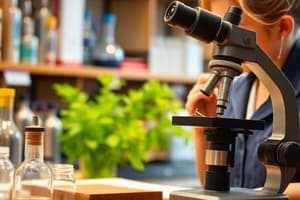Podcast
Questions and Answers
Which of the following is the MOST logical initial step in the scientific method?
Which of the following is the MOST logical initial step in the scientific method?
- Analyzing data and drawing conclusions.
- Making an observation. (correct)
- Conducting an experiment.
- Formulating a testable hypothesis.
A hypothesis is a proven fact that explains a specific event or phenomenon.
A hypothesis is a proven fact that explains a specific event or phenomenon.
False (B)
In the context of the scientific method, define what a testable hypothesis is.
In the context of the scientific method, define what a testable hypothesis is.
A testable hypothesis is an explanation for an event that can be tested through experimentation or observation.
The scientific method relies on obtaining information, or __________, to ask and answer questions.
The scientific method relies on obtaining information, or __________, to ask and answer questions.
Consider the 'broken toaster' example. If, after plugging the toaster into a different outlet it works, what can be concluded?
Consider the 'broken toaster' example. If, after plugging the toaster into a different outlet it works, what can be concluded?
Match each sense with its role in scientific observation
Match each sense with its role in scientific observation
Why is observation so important in the scientific method?
Why is observation so important in the scientific method?
In the scientific method, what is the purpose of 'doing background research'?
In the scientific method, what is the purpose of 'doing background research'?
Which of the following best describes the process of induction in scientific reasoning?
Which of the following best describes the process of induction in scientific reasoning?
In inductive reasoning, the accuracy of a conclusion is independent of the quantity and quality of particular observations.
In inductive reasoning, the accuracy of a conclusion is independent of the quantity and quality of particular observations.
A marine biologist observes that several different types of fish have gills. What is the next step in the inductive reasoning process to investigate whether all fish have gills?
A marine biologist observes that several different types of fish have gills. What is the next step in the inductive reasoning process to investigate whether all fish have gills?
In deductive reasoning, one starts with a general conclusion to make a ______ conclusion.
In deductive reasoning, one starts with a general conclusion to make a ______ conclusion.
Which of the following is an example of deductive reasoning?
Which of the following is an example of deductive reasoning?
The general conclusion (hypothesis) used in deductive reasoning is often the result of inductive reasoning.
The general conclusion (hypothesis) used in deductive reasoning is often the result of inductive reasoning.
If the general conclusion is 'All birds can fly,' deductive reasoning might lead to the specific conclusion that a robin is a bird, so it ______.
If the general conclusion is 'All birds can fly,' deductive reasoning might lead to the specific conclusion that a robin is a bird, so it ______.
Match each statement with the type of reasoning it exemplifies:
Match each statement with the type of reasoning it exemplifies:
Which of the following best describes the role of a prediction in the scientific method?
Which of the following best describes the role of a prediction in the scientific method?
In the scientific method, if a specific hypothesis is not fully supported, the general hypothesis from which it was derived is automatically invalidated.
In the scientific method, if a specific hypothesis is not fully supported, the general hypothesis from which it was derived is automatically invalidated.
What is the primary difference between induction and deduction in the context of scientific reasoning?
What is the primary difference between induction and deduction in the context of scientific reasoning?
The step in the scientific method that involves gathering information about a phenomenon is known as ______.
The step in the scientific method that involves gathering information about a phenomenon is known as ______.
Match each term with its corresponding description:
Match each term with its corresponding description:
A scientist observes that all observed marine animals have gills. Based on this, they hypothesize 'All marine animals have gills.' Which of the following observations would best test this hypothesis?
A scientist observes that all observed marine animals have gills. Based on this, they hypothesize 'All marine animals have gills.' Which of the following observations would best test this hypothesis?
If an experiment's results do not align with the prediction made based on a hypothesis, the hypothesis is definitively proven false and should be discarded.
If an experiment's results do not align with the prediction made based on a hypothesis, the hypothesis is definitively proven false and should be discarded.
A scientist formulates the hypothesis that 'Fish need to swim in order to survive'. Describe a controlled experiment to test this hypothesis, and indicate what results would support or refute the hypothesis.
A scientist formulates the hypothesis that 'Fish need to swim in order to survive'. Describe a controlled experiment to test this hypothesis, and indicate what results would support or refute the hypothesis.
Flashcards
Scientific Method
Scientific Method
A series of steps used by scientists to answer questions and solve problems.
Observation
Observation
The initial step in the scientific method, involving noticing and describing events or processes.
Hypothesis
Hypothesis
A testable statement or explanation for an observation.
Prediction
Prediction
Signup and view all the flashcards
Experiment/Test
Experiment/Test
Signup and view all the flashcards
Data Analysis
Data Analysis
Signup and view all the flashcards
Report Out
Report Out
Signup and view all the flashcards
Background Research
Background Research
Signup and view all the flashcards
Induction
Induction
Signup and view all the flashcards
Inductive Hypothesis
Inductive Hypothesis
Signup and view all the flashcards
Limits of Induction
Limits of Induction
Signup and view all the flashcards
Deduction
Deduction
Signup and view all the flashcards
Deductive Reasoning
Deductive Reasoning
Signup and view all the flashcards
Test Prediction
Test Prediction
Signup and view all the flashcards
General Hypothesis
General Hypothesis
Signup and view all the flashcards
Specific Hypothesis
Specific Hypothesis
Signup and view all the flashcards
Prediction (Scientific Method)
Prediction (Scientific Method)
Signup and view all the flashcards
Phenomenon (Observation)
Phenomenon (Observation)
Signup and view all the flashcards
Experiment
Experiment
Signup and view all the flashcards
Study Notes
The Scientific Method
- It involves observation, questioning, hypothesizing, predicting, and testing
- It uses observation to obtain information (data) to use in answering questions
- Observation can be done by reading, feeling, hearing, tasting, or smelling
- Anything that cannot be observed is outside the realm of science
Steps of the Scientific Method
- Observation
- Asking a question
- Background Research
- Form a Testable Hypothesis
- Experiment/Test
- Data Analysis
- Conclusion
- Report Out
Hypothesis
- A suggested explanation for an event that can be tested
Induction
- A scientist starts making a series of individual observations
- Particular observations include a marine biologist observing a sailfish, shark, and tuna, noting that they all have gills
- A general question can become, "Do all fish have gills?"
- A general conclusion (hypothesis) can be, "All fish have gills"
- Make a prediction saying, "If something is a fish, then it should have gills."
- Sampling a different fish tests the prediction
Induction: Limits
- The accuracy of the conclusion (hypothesis) is related to the amount and quality of particular observations
- For example, a marine biologist observed a sailfish, shark, and a tuna and found that they all had gills
- A question is, "Do all marine animals have gills?"
- A general conclusion (hypothesis): "All marine animals have gills"
- Prediction: If it is a marine animal, then it should have gills
- Test prediction: Sample a different marine animal
Deduction
- General conclusion is used to make a specific conclusion
- A general conclusion (hypothesis) is the result of induction (based on particular observations)
- An example of a general conclusion (hypothesis) could be "All marine animals have gills"
- If whales are marine animals, then they should have gills
- Sample and observe a whale to test the prediction
Studying That Suits You
Use AI to generate personalized quizzes and flashcards to suit your learning preferences.




